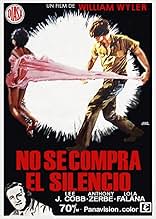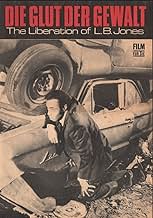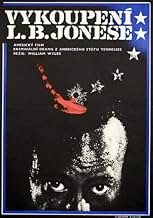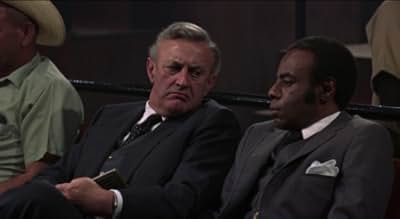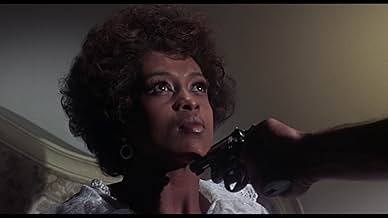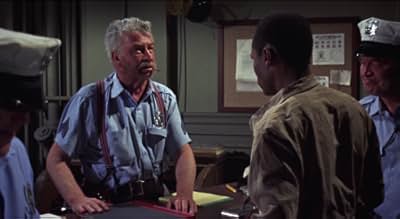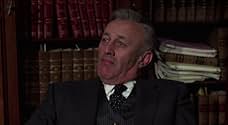NOTE IMDb
6,8/10
1,3 k
MA NOTE
Un avocat sudiste révèle la vérité sur un croque-mort assassiné.Un avocat sudiste révèle la vérité sur un croque-mort assassiné.Un avocat sudiste révèle la vérité sur un croque-mort assassiné.
- Réalisation
- Scénario
- Casting principal
- Récompenses
- 1 nomination au total
Joseph Attles
- Henry
- (as Joe Attles)
Avis à la une
I've read the book liberties & omissions were taken, overall this movie is a true gem no sugar coating here I recommend you watch it & read the book you'll come full circle I guarantee it. I would also add a remake of this wouldn't hurt just too put more flesh on the characters & script it.
It is appropriate that the title character is an undertaker for this final film from William Wyler feels like a mass funeral for all hopes of racial reconciliation in the America of 1970, (not that it's gotten any easier now). The last shot of the two white liberals and the lone black radical sitting on opposite sides of the train as it flees the benighted region of bigotry and violence says it all. You certainly do not expect that these thee will come together once the train passes from Kentucky to Ohio! A powerful, somber image to end a powerful, somber film. Somber but not dull. Sure the proceedings can get lurid at times, even semi trashy. But I prefer this to the heavy handed, messagey treatment Hollywood has often employed when dealing with black/white conflict. (See the ouevre of Stanley Kramer and his students). Indeed, had the screenplay, by Stirling Silliphant (revisiting racial bleakness after "In The Heat Of The Night") and Jesse Hill Ford (the novelist upon whose work the film is based and himself a tragic figure), been better, with a fuller examination of the white liberals' characters and their relationship with the white patrician lawyer, wonderfully played by Lee J Cobb, then this film would have approached greatness, in my opinion. As it is let us give it a B for a solid end to one of Hollywood's most distinguished directorial runs, as well as the performances of Cobb, Anthony Zerbe and Arch Johnson, playing two of the more despicable redneck cops you'll ever see, a young and intense Yaphet Kotto and, above all, Roscoe Lee Browne as defiant, unbending LB Jones. Haven't seen enough of this fine actor's work to say whether it's his best but it has to rank fairly high, one would think.
PS...I regularly excoriate TCM on its programming choices (like devoting an entire day to the work of Arlene Dahl or repeatedly showing "Wait Until Dark" and "Alice In Movieland") but I have to congratulate whoever came up with last month's spotlight on final films from great directors. A total blast. At the very least, (as in "Ambush"), interesting and at best, (as in "Madadayo"), eye opening.
PS...I regularly excoriate TCM on its programming choices (like devoting an entire day to the work of Arlene Dahl or repeatedly showing "Wait Until Dark" and "Alice In Movieland") but I have to congratulate whoever came up with last month's spotlight on final films from great directors. A total blast. At the very least, (as in "Ambush"), interesting and at best, (as in "Madadayo"), eye opening.
The Liberation of L. B. Jones (1970) is currently available on Tubi. The storyline involves a black couple going through a divorce when the man discovers his wife is cheating on him with a local white police officer. When the woman hires a lawyer and threatens to fight the divorce, the police officer is informed the nature of their relationship may become public. Since white and black people sleeping together is heavily frowned upon the police officer could lose his job. He quickly goes on a rampage beating his lover and trying to hide the nature of their relationship by any means necessary. This movie is directed by William Wyler (Ben-Hur) and stars Lee J. Cobb (12 Angry Men), Lola Falana (The Klansman), Lee Majors (The Six Million Dollar Man), Roscoe Lee Browne (Logan's Run) and Yaphet Kotto (Alien). The storyline for this is very well told and portrayed. The ex-husband's patience was absolutely unbelievable, but so was his wife's ruthlesness. This movie in some ways gave me divorce PTSD. I loved the character interactions across the board and the set-up by the ruthless and dirty police officers was good, which makes the ending even more enjoyable. Overall this is a smart movie with a well told storyline I would strongly recommend seeing. I'd score this a solid 7.5/10.
William Wyler had such a diverse and non-stereotypical career. He painted on a grand canvas with "Ben-Hur," "Funny Girl," and "The Big Country," romped about with fluff on "Roman Holiday" and "How To Steal A Million," and reined in on tight dramas like "Jezebel," "Detective Story," and "The Collector", all to name but a few. "The Liberation of L.B. Jones" was his last film, and its message is still powerful and taut. Here, Wyler reins in very tightly on a drama, placing his camera stock still in three-walled sets and allows the intensity to grow from the individuals coming undone within its frame.
Hollywood was just turning the corner in its presentation of dramatic material around 1970, with the revolutionary "The Graduate," "Bonnie & Clyde", and "Midnight Cowboy" already released, so Wyler's effort appears rooted to an earlier period in its presentation. Elmer Bernstein's music is bombastic and overly showy. The confining studios sets scream of the backlot environment "daring" pictures were then moving away from. And Wyler's static camera technique is a far cry from the fluid shots used by up 'n coming directors Penn, Nichols, Friedkin, and Wexler. But the overall tone and downbeat ending of "Jones" foreshadowed the de rigueur hard-edged storytelling that would make '70s pictures so vibrant.
Taking place in some jerkwater burg in Tennessee, the title character of L.B. Jones (played with dignified austerity by Roscoe Lee Browne) is a wealthy undertaker whose wife (the smoldering hussy embodied by Lola Falana) is practically rubbing his nose in her affair with a local cop. Jones wants to divorce her. The proceedings, if a courtroom action is necessary, would reveal her liaisons with the policeman, played by Anthony Zerbe, and Zerbe truly does not want his own wife to know of his infidelity. Thus, sets in motion the harrassment and tragedy of L.B.'s situation as only a town full of rednecks can perpetrate towards the threat of an intelligent, self-made African-American man.
Lee J. Cobb as the town's D.A. who always finds a way to help out the white folks, at the expense of blacks, walks a fine line of bigotry and self-discovery. It may be L.B.'s "liberation", but it's Cobb's character that will ultimately be put to a test. What's unique about this film is that he fails, miserably. Most movies made in the '80s and '90s about the racial plight of African-Americans, whether it be "Cry Freedom" or "Amistad" always have that knight in shining "white" armor that studios feel are needed to "help" the black man break the bonds of tyranny. The black character is never allowed to just gain freedom, discovery or triumph on the merits of his own strengths. This film has the guts to show L.B. take his "liberation" into his own hands, albeit with tragic results, and damns the white majority who are a long way from compassion and understanding.
The standout performance in the flick comes from Anthony Zerbe. If all you've seen are his scenery chewing in "Omega Man," his digit-dropping in "Papillon" or his head exploding in "License To Kill," check out his fully-fleshed out character of Willie Joe in this film. He embodies centuries of redneckdom in one person, portraying the self-inflated, unrepentent coward sheltered in police corruption so effectively that he masterfully overshadows the performances of everyone else onscreen. Unfortunately, Yaphet Kotto as a vengeful out of town visitor is given very little to do. And Barbara Hershey and Lee Majors barely have enough motivation to fill in their sketchy roles as Cobb's daughter and her altruistic lawyer husband.
If you can stand a little datedness to the narrative (and Elmer Bernstein's horrible score), take a look at this unflinching glimpse at an era of bigotry we thought was eradicated...but it's obviously not. My rating **1/2 out of ****.
Hollywood was just turning the corner in its presentation of dramatic material around 1970, with the revolutionary "The Graduate," "Bonnie & Clyde", and "Midnight Cowboy" already released, so Wyler's effort appears rooted to an earlier period in its presentation. Elmer Bernstein's music is bombastic and overly showy. The confining studios sets scream of the backlot environment "daring" pictures were then moving away from. And Wyler's static camera technique is a far cry from the fluid shots used by up 'n coming directors Penn, Nichols, Friedkin, and Wexler. But the overall tone and downbeat ending of "Jones" foreshadowed the de rigueur hard-edged storytelling that would make '70s pictures so vibrant.
Taking place in some jerkwater burg in Tennessee, the title character of L.B. Jones (played with dignified austerity by Roscoe Lee Browne) is a wealthy undertaker whose wife (the smoldering hussy embodied by Lola Falana) is practically rubbing his nose in her affair with a local cop. Jones wants to divorce her. The proceedings, if a courtroom action is necessary, would reveal her liaisons with the policeman, played by Anthony Zerbe, and Zerbe truly does not want his own wife to know of his infidelity. Thus, sets in motion the harrassment and tragedy of L.B.'s situation as only a town full of rednecks can perpetrate towards the threat of an intelligent, self-made African-American man.
Lee J. Cobb as the town's D.A. who always finds a way to help out the white folks, at the expense of blacks, walks a fine line of bigotry and self-discovery. It may be L.B.'s "liberation", but it's Cobb's character that will ultimately be put to a test. What's unique about this film is that he fails, miserably. Most movies made in the '80s and '90s about the racial plight of African-Americans, whether it be "Cry Freedom" or "Amistad" always have that knight in shining "white" armor that studios feel are needed to "help" the black man break the bonds of tyranny. The black character is never allowed to just gain freedom, discovery or triumph on the merits of his own strengths. This film has the guts to show L.B. take his "liberation" into his own hands, albeit with tragic results, and damns the white majority who are a long way from compassion and understanding.
The standout performance in the flick comes from Anthony Zerbe. If all you've seen are his scenery chewing in "Omega Man," his digit-dropping in "Papillon" or his head exploding in "License To Kill," check out his fully-fleshed out character of Willie Joe in this film. He embodies centuries of redneckdom in one person, portraying the self-inflated, unrepentent coward sheltered in police corruption so effectively that he masterfully overshadows the performances of everyone else onscreen. Unfortunately, Yaphet Kotto as a vengeful out of town visitor is given very little to do. And Barbara Hershey and Lee Majors barely have enough motivation to fill in their sketchy roles as Cobb's daughter and her altruistic lawyer husband.
If you can stand a little datedness to the narrative (and Elmer Bernstein's horrible score), take a look at this unflinching glimpse at an era of bigotry we thought was eradicated...but it's obviously not. My rating **1/2 out of ****.
In small town Tennessee, Sonny Boy Mosby (Yaphet Kotto) jumps off the train with a pistol. Rich businessman L. B. Jones (Roscoe Lee Browne) is desperate to divorce his wife Emma who is having an affair with white police officer Willie Joe Worth. Emma intends to hold L. B. to ransom before giving him a divorce. Officer Worth wants him to drop the matter entirely. Lawyers Oman Hedgepath (Lee J. Cobb) and his nephew Steve Mundine (Lee Majors) also advise him to let it go. Officers Worth and Bumpas like to brutalize the black community.
This definitely has a feel of "In the Heat of the Night" except the story is messier and less iconic. A bit of simplification would make this more compelling. I know it's based on a book, but most of time, long books need to be chopped down in order to fit into a movie. It also pales in comparison with others of its genre.
This definitely has a feel of "In the Heat of the Night" except the story is messier and less iconic. A bit of simplification would make this more compelling. I know it's based on a book, but most of time, long books need to be chopped down in order to fit into a movie. It also pales in comparison with others of its genre.
Le saviez-vous
- AnecdotesFinal film of director William Wyler.
- Citations
Emma Jones: It going be something. I can't let nobody rob my baby and I can't let my baby enter this world without a dime!
- ConnexionsFeatured in Classified X (2007)
Meilleurs choix
Connectez-vous pour évaluer et suivre la liste de favoris afin de recevoir des recommandations personnalisées
Détails
- Date de sortie
- Pays d’origine
- Langue
- Aussi connu sous le nom de
- The Liberation of L.B. Jones
- Lieux de tournage
- Humboldt, Tennessee, États-Unis(location shooting - used for Somerton, Tenn.)
- Société de production
- Voir plus de crédits d'entreprise sur IMDbPro
Box-office
- Budget
- 3 500 000 $US (estimé)
Contribuer à cette page
Suggérer une modification ou ajouter du contenu manquant

